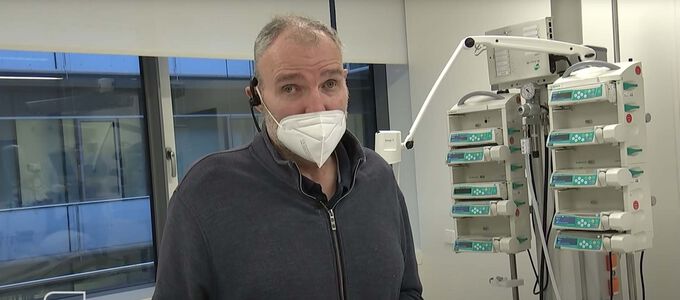
For five weeks Werner Buthe was in a medically induced coma. Five weeks between hope and fear. Now that he has recovered, nothing is as it used to be for the Covid patient from Frankfurt, Germany.
It is 4:55 a.m. on Wednesday, 14 July 2021. Werner Buthe is tapping into his mobile with his last ounce of strength. His call goes to voicemail. His wife can hear him struggle to breathe as he whispers: “I have always loved you. I’m sorry.” Then there is silence—five long weeks.
Werner Buthe fell into a coma. He was put on life support, on extra corporeal membrane oxygenation (ECMO). It pumps blood outside of the body, removes carbon dioxide, and pumps oxygen-filled blood back into the body. Not many people who have to be connected to such a machine survive.
It all started relatively mild
Werner Buthe is no stranger to the New Apostolic world. He is involved in event management, and many brothers and sisters in Germany know him as a moderator of social media groups. At the end of June last year, he caught the flu, so he thought. Two rapid antigen tests were negative, but his condition worsened so that he went to see his doctor. He was diagnosed with Covid-19, which was later confirmed at the hospital with a PCR test. He had been wary of vaccines and was still waiting for an update of the vaccines to target the Delta variant of the virus. Today he regrets it: “It nearly cost me my life.”
And it got worse and worse
His shortness of breath became worse by the day. His oxygen was automatically upped more and more. Beeps signalled if the oxygen level was too low. He had to do a certain breathing technique. He still remembers the beeping. “Those were moments I was afraid I was going to die.” On 14 July the treatment was no longer working. His pulse collapsed. “And then I suffocated.” He lost consciousness and was put on a ventilator. “My last thought was: dear God, will I see you in a minute or should I go back and still take of something?”
Fearing for her husband’s life
Every day his family called the hospital. “No change,” was the response of the health workers. All they could do was pray. His wife, who had also contracted Covid, was in quarantine and had to deal with the fear of losing her husband alone. Werner received many get-well wishes on social media while he was in hospital, also from his congregation. “I never felt alone.”
Then, finally, after three weeks in a medically induced coma, Werner was able to breathe on his own again and could be taken off the ECMO. It took another two weeks before he finally woke up again. “Dear Lord, thank You. Amazing,” was the sigh He sent to heaven. For him the time in the coma had felt like a moment, for his family it had seemed like an eternity.
Back again
When Werner Buthe finally came to again after five weeks he had to learn everything all over again. His muscle mass had wasted away so that he could not even sit on the edge of his bed. “I had no strength in my arms, my legs, my hands, or my fingers. Nothing,” he describes the feeling of utter helplessness. He could not grab or hold anything. He could not even take a shower or go to the toilet. Nor could he communicate because neither his tongue nor his hands and feet did what they were supposed to do. He was fed through a stomach tube and had a catheter and diapers. But he refused to give in to shame: he wanted to live.
Werner Buthe was fighting his way back into what he calls his second life. “First I learned to sit on the edge of the bed. Then, with the help of a therapist, I managed to stand for a few seconds. I was deliriously happy,” he says. “I spent a total of three-and-a-half months in hospital, in three different hospitals on six different wards. I was even in palliative care for a few days because there was no room in the intensive care unit.”
A new life
The fight was worth it. His lungs have recovered almost completely. Now he is struggling with Long Covid. Werner, a former cyclist, is often tired, and in the evenings he feels aches and pain all over his body. But he has learned something for himself. “Hopeless is far from hopeless. There is hope to the end. The time I have is finite.”
Werner wants to use it to do something. For his recovery means: “God has said, ‘I still need you.’” He is sure of that. He does say though: “I am not sure yet for what.” He is trying to find out by walking through his new life with open eyes and watching to see whether anyone needs help.
At the initiative of the Frankfurt University Hospital, for whom his case was anything but routine, Werner Buthe has made a start. Healthcare workers have asked him to talk about his story, his long road to recovery. It all started with a feature on regional television. A news programme accompanied Werner Buthe back to the place where he had so narrowly escaped death.
Screenshot: Hessischer Rundfunk




